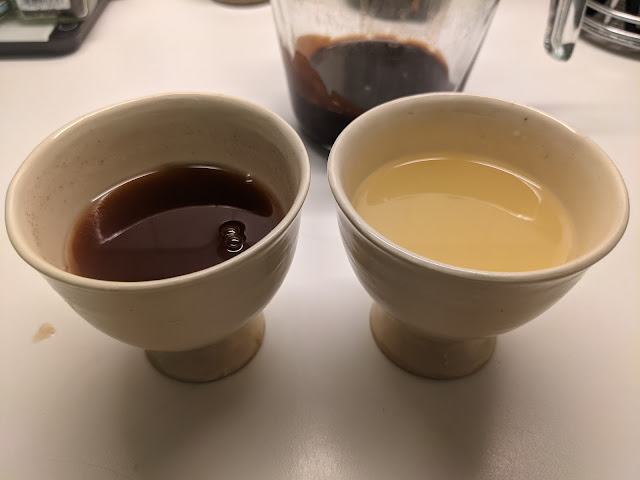Methods for Cooking Rice
Previously, I'd struggled with adequately hydrating millet and rice while steaming. You'd think this wouldn't be a problem, but once the grain is at the temperature of the steam, no more steam will condense on it. If it's not already wet, it gets hot, but not really cooked.
Steaming grain twice (letting it cool in between) helped, as did wrapping the grain in cloth, but not enough. I was missing something.
Reading through Science and Civilisation in China, Volume 6, Part 5, Fermentations and Food Science, which is far and away the most complete and well-researched English-language book on the topic of Chinese brewing, I've spotted a hint.
A line from a poem in the Shi Jing, the Classic of Poetry, this one from the 10th to 9th century BCE:
生民
I'm not totally convinced by this translation. My dictionary gives the words in question as an onomatopoeia for washing rice, so it'd be something like "we wash it washy-washy, we steam it fluffy-fluffy." However. Soaking seems to make a big difference.
I took 200mL of white sushi rice to make a short wine, washed it, and soaked it for three hours. It swelled to 300mL and may have swelled more if I had let it soak longer. That's a big difference in water content.
After steaming for 30 minutes (starting from cold water), the rice is nearly cooked enough. The grains on top are a little al dente, but the rest are fluffy and fully cooked. Soaking worked. I steamed the rice a second time to make sure that it was thoroughly cooked throughout, although it still absorbed water after steaming and I needed to add more to get it fermenting.
I soaked more rice for about 12 hours and it expanded about the same amount: to 1.5x volume.
This helped with hydrating the rice, but wasn't really enough. I needed to add more water to get it to ferment. I might have been rushing it though, since I was trying to make it in time for Mudthaw. It's possible that the alcohol produced by fermentation, combined with the freeing of the water of hydration bound up in the starch, will add enough liquid to allow the rice to continue breaking down.
Steaming grain twice (letting it cool in between) helped, as did wrapping the grain in cloth, but not enough. I was missing something.
Reading through Science and Civilisation in China, Volume 6, Part 5, Fermentations and Food Science, which is far and away the most complete and well-researched English-language book on the topic of Chinese brewing, I've spotted a hint.
A line from a poem in the Shi Jing, the Classic of Poetry, this one from the 10th to 9th century BCE:
生民
...
誕我祀如何?或舂或揄,或簸或蹂。釋之叟叟,烝之浮浮。
...
The given translation for this is:
We pound the grain, we bale it out,The poem is talking about how food is prepared for sacrifices, but the cooking methods are probably the same for normal food.
We sift, we tread,
We wash it, we soak it,
We steam it through and through.
I'm not totally convinced by this translation. My dictionary gives the words in question as an onomatopoeia for washing rice, so it'd be something like "we wash it washy-washy, we steam it fluffy-fluffy." However. Soaking seems to make a big difference.
I took 200mL of white sushi rice to make a short wine, washed it, and soaked it for three hours. It swelled to 300mL and may have swelled more if I had let it soak longer. That's a big difference in water content.
After steaming for 30 minutes (starting from cold water), the rice is nearly cooked enough. The grains on top are a little al dente, but the rest are fluffy and fully cooked. Soaking worked. I steamed the rice a second time to make sure that it was thoroughly cooked throughout, although it still absorbed water after steaming and I needed to add more to get it fermenting.
I soaked more rice for about 12 hours and it expanded about the same amount: to 1.5x volume.
This helped with hydrating the rice, but wasn't really enough. I needed to add more water to get it to ferment. I might have been rushing it though, since I was trying to make it in time for Mudthaw. It's possible that the alcohol produced by fermentation, combined with the freeing of the water of hydration bound up in the starch, will add enough liquid to allow the rice to continue breaking down.
This work is licensed under a Creative Commons Attribution-ShareAlike 4.0 International License.



Comments
Post a Comment